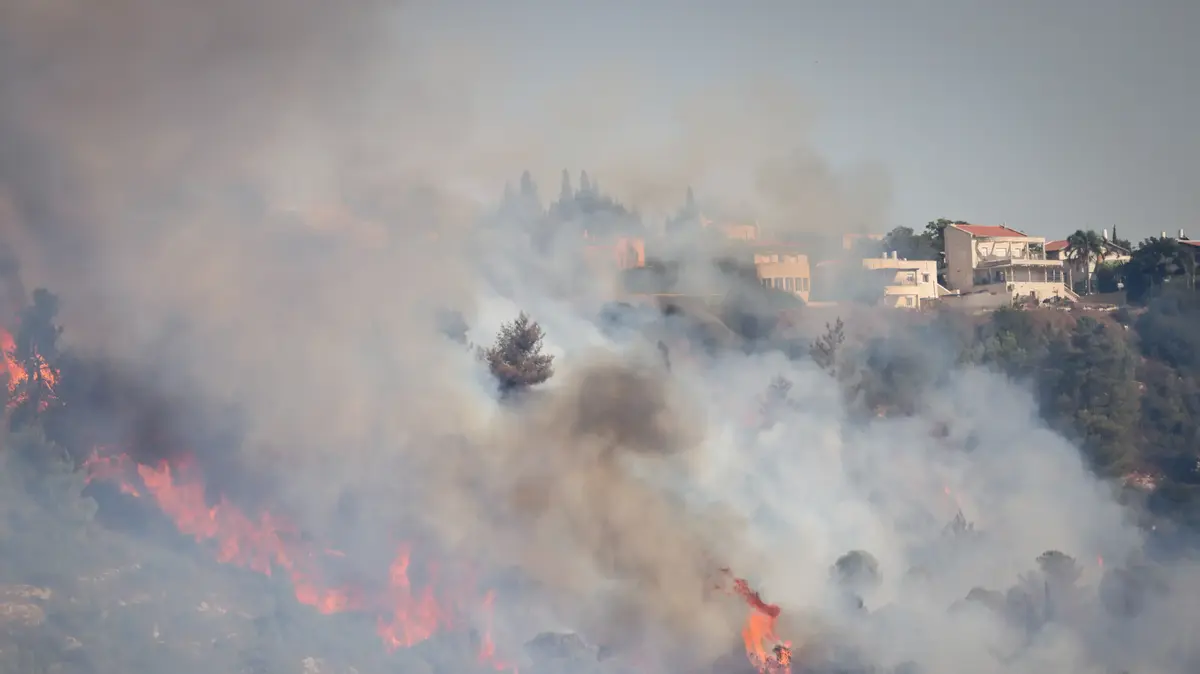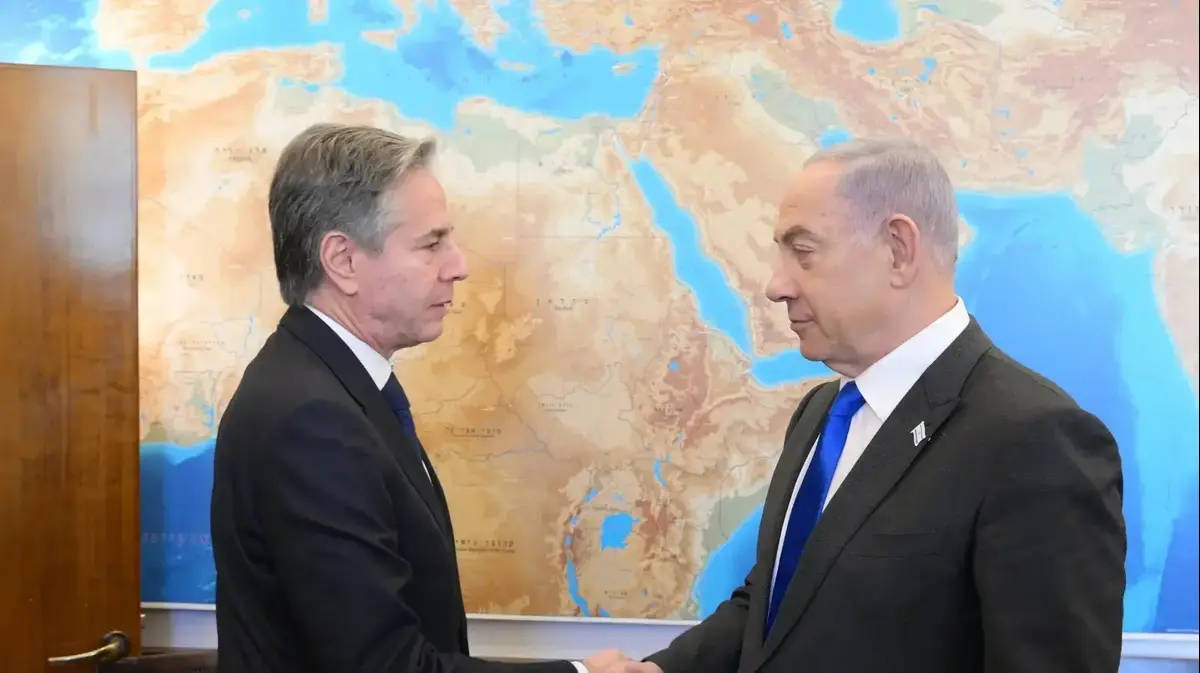news
Opinions and interpretations
The state of Israel's ecosystems is declining - and that's not good for us
The Ministry of Environmental Protection and HaMarg have published a worrying report that the state of ecosystem services in Israel is deteriorating as a result of human activity.
The main finding of the report - The terrestrial and marine ecosystems in Israel provide essential system services for the existence, health and well-being of the country's residents
Tags
Ministry of the Environment
density
Noa Steiner
Saturday, 23 October 2021, 17:50 Updated: 17:56
Share on Facebook
Share on WhatsApp
Share on general
Share on general
Share on Twitter
Share on Email
0 comments
The scene of the shooting incident at the Jaffa port, October 23, 2021
Corona vaccine study in 18-12 year olds: 90% efficacy ...
Aryeh Lev The mythological librarian of Kiryat Shmona went ...
The heads of the Bedouin sector in the Negev: "They are inciting against us, we need ...
Demonstration in Umm al-Fahm, October 22, 2021
Meeting of Foreign Ministers of Israel, the United States and the United Arab Emirates ...
Protection in the north: Three residents of Avtin were accused of arson ...
Finance Minister Avigdor Lieberman in an interview with Tal ...
President of China: "We will peacefully reunite with ...
A 20-year-old man was arrested on suspicion of murdering his mother at her home in Beit Shemesh ...
Arrest of "Mossad agents" in Turkey, from TV ...
Documentation of the activities of the multidimensional unit during Operation ...
In the video: 25,000 dunams caught fire in the Jerusalem mountains (Photo: Fire and Rescue, Uri Livne)
After eight years of research and the participation of 200 scientists and experts, this week the Steinhardt National Museum of Nature launched a report evaluating the ecosystem services in Israel that evaluated the benefits and services that Israelis receive from nature and ecosystems.
The report, led by the Ministry of Environmental Protection and Hamarg - The National Program for Assessing the State of Nature in Israel, reviewed all the information available on the subject of nature's contribution to man.
The report addressed three main groups of benefits that local nature provides to Israeli citizens - supply, regulation and cultural services from a variety of ecosystems - deserts, Mediterranean systems including woods, tea and forest, marine, waterways in the mainland of the country such as streams, the Sea of Galilee and the Dead Sea, agricultural systems As well as ecosystems in cities and towns that are often defined as urban nature.
The main finding of the report - the terrestrial and marine ecosystems in Israel provide essential system services for the existence, health and well-being of the country's residents.
More on Walla!
The report of the Ministry of Environmental Protection reveals: These are the polluting factories in Israel
To the full article
Trees slow down the speed of the wind that carries dust particles and pollutants.
The fire in the Jerusalem mountains, August (Photo: Official website, Flash 90)
The superpowers of ecosystems - reducing floods, fires and dust
Ecosystem services include regulation services such as temperature regulation by shading trees, climate regulation - nature's contribution to climate stability, pollination of agricultural crops by bees, regulation of natural disasters and extreme events such as fires and floods, regulation of air quality we breathe, water quality we drink And soil quality.
Among the specific examples that the report surveyed are also the protection that natural vegetation provides against runoff flow that creates floods in agricultural and urban areas. In the Mediterranean marine system, species of bacteria and tiny marine creatures reduce the concentration of pollutants that reach the shores and seas, such as spills from the Shafdan, and the weathering regulation of the coastal strip and kurkar cliffs is supported by snails and algae that form and maintain rocky structures. These structures moderate the strength of the sea waves to which the kurkar cliffs on the shore are exposed, thus helping to protect them from collapse.
Dust regulation service is also reviewed in the report. Trees and shrubs slow down the speed of the wind that carries dust particles and other air pollutants, and these are trapped in vegetation, absorbed in it or sink to the ground. This capture of pollutants by the vegetation in Mediterranean systems reduces their concentration in the air, and may improve air quality for humans and thus protect our health.
In Israel, sulfur particles, a pollutant from industry and transportation, are found to be trapped by grove and forest trees in the Carmel at about 8 kg of sulfur per hectare per year. The biological soil membranes are mainly composed of algae, bacteria and lichens, and cover several thousand square kilometers - absorbing about 280 grams of dust per square meter per year, twice as much as artificial dust absorption facilities. Damage to these delicate biological soil membranes, for example as a result of heavy vehicles SUVs traveling off existing trails as well as vegetative dehydration cause a large release of dust into the
air.Regulation services reviewed in the report and found in Israel are provided by almost exclusively local ecosystems, yet all these services are declining, and the bad news is that most services have no substitute.
80% of all delivery services are manufactured in ecosystems outside Israel.
Fishing in the Sea of Galilee on a downward trend (Photo: Yoni Dotan, Kinneret Cities Association)
Outdoor recreation - brought to you under the auspices of the ecosystems
Recreational and leisure cultural services that nature provides to man including education, inspiration, religion and heritage however are on the rise due to the growing demand.
Outdoor recreation is assessed, for example, by the number of photos people take at nature sites outside the city.
According to Dr. Yael Ram of the Ashkelon Academic College, accessibility to nature should come with sensitivity to conserving ecosystems in order not to overload and cause damage to popular sites such as waterways and picnic sites.
The report emphasizes that many plant and animal species are important to the heritage and tradition heritage of local and religious populations from across the country.
For example, the 131 plant species found in Mediterranean systems such as shrubs, shrubs and herbs - are attributed traditions and customs of use for food, drink, seasoning and medicine.
62 sacred tree sites were also identified, most of which belong to four species - common oak, Atlantic oak, common carob and Tabor oak.
However, these cultural services and the enjoyment of Israelis and tourists from the local nature are also threatened by many factors.
For example, invasive species such as the migratory jellyfish that reach the Mediterranean Sea detract from the enjoyment of many people bathing in the sea.
We depend on nature for food, water and medicine
Ecosystem delivery services include for example water supply, food, as well as genetic resources that can also be used for medicines.
The report found that about 80% of all supply services are manufactured in ecosystems outside the country.
This is also as a result of the deterioration of supplies in the country, for example fishing in the Sea of Galilee is declining.
In order to produce the products of supply services that are imported to Israel every year, an area almost 1.5 times larger than the land area of the country is required.
Nature's genetic resources are the basis for the supply of many medicines to man.
In the desert system in Israel alone, 20 species have been found that are already known today to have medicinal properties that are in various stages of research towards drug development, and the hand is still outstretched.
The decline in ecosystem services - indirect and direct factors
The report showed the direct causes of the deterioration in ecosystems and the benefits and services that citizens receive from them.
The most damaging factor at the top of the list is the changes in land uses such as the transformation of natural areas, followed by climate change, invasive species, overexploitation of natural resources, and pollution.
However, behind all these direct factors are indirect factors that are at the root of the problem and include an increase in population density, economic factors such as overgrowth and consumption, political, security factors, and more.
The population density in Israel is one of the highest in the world, with 400 people per square kilometer. The Central Bureau of Statistics estimates that the density will only increase, since by 2050 the population of Israel will probably number about 15 million people.
According to Dr. Itai Renan, director of the fabric at the Steinhardt Museum of Nature at Tel Aviv University, the project's findings suggest that the pressures exerted on ecosystems, especially in light of the continuing increase in population size, are leading to a deterioration in quality of life in Israel.
"Our commitment is to fight these crises."
Zandberg (Photo: Yoav Itiel)
Minister Tamar Zenberg emphasized at the launch of the report that alongside the climate crisis, there is another crisis and that is the ecological crisis.
"These two crises are intertwined and endanger human welfare on Earth. Our commitment is to fight these crises. We will work to increase the protection of Israel's ecosystems, including reducing the transformation of open and natural areas, allocating additional protected areas at sea and on land, and conserving endangered species. "Extinction," she said.
It should be noted that the Minister of Environmental Protection supports a law promoted by MK Prof. Alon Tal and passed earlier this month in a preliminary reading aimed at anchoring the report on the state of nature and biodiversity legally, in accordance with the requirements of the Israel Biodiversity Convention. Next new and ambitious global goals for the protection of nature and biodiversity.
An alarming picture of a deteriorating situation
In a telephone interview with Walla! Prof. Sternberg of Tel Aviv University said that "the report presents a rather alarming picture of a deteriorating situation, since most of the indicators are in a state of decline and the ability to provide ecosystem services in Israel is declining." Sternberg added that there is a lot of talk about the importance of preserving what is given - as a key to the stability of ecosystems. According to him, everything must be done to prevent the conversion of natural areas, for example, into construction projects, but today that is no longer enough. In the context of climate change, he emphasizes that extreme events such as floods and fires will only worsen and therefore need to move to active actions, mitigation and preparedness for climate change in order to reduce the damage from extreme events and in his view, it still does not happen at the required scale and speed. In addition, the climate crisis will affect the potential for food supply. "Since the State of Israel is dependent on food imports, we are dependent on the reality that takes place outside Israel, in a world that is changing, and we must prepare for that as well."
The density in Israel is only expected to increase.
Tel Aviv (Photo: Reuven Castro)
A comprehensive plan for climate and nature is needed
Prof. Sternberg stressed that the issue of climate should be addressed from an inclusive government perspective, and that a senior climate consultant with real powers should be appointed, similar to what has been done in the United States.
Prof. Sternberg stressed that the Israeli government must formulate and implement a plan for carbon neutrality by 2050 as soon as possible.
Tel Aviv University is the first university in the country to begin formulating a carbon neutrality plan for 2030 that also includes reference to the open spaces and the botanical garden in its territory.
At the White House, President Biden set up a climate policy department in January, led by national climate adviser Gina McCarthy, who heads a cabinet of leaders from 21 government agencies and federal government ministries. Just this month, the Biden government launched a 'Climate Roadmap for Climate-Sustainable Economy' led by McCarthy as part of which all government procurement will be re-examined and legislation is expected to change so that companies with small climate footprints are preferred in tenders, and this is just the first step In a country that will include financial reporting.
Carmel Horowitz from the 'Climate-Ecological Emergency Headquarters' campaign emphasized by Walla!
Because they demand that the government build a serious and comprehensive plan adapted to a climatic-ecological emergency.
"The Israeli government must build a plan that includes legislation that changes priorities for the first time, with the understanding that our lives depend on it. In Glasgow they will talk about the climate, but keep in mind that ecosystems are inseparable from climate systems. Join us this weekend for emergency demonstrations around the country. "
Share on Facebook
Share on WhatsApp
Share on general
Share on general
Share on Twitter
Share on Email
0 comments















